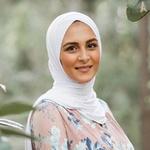'If You’re Struggling With Anything in Your Life, Do Something for Someone Else'
Community
|
Nov 17, 2021
|
9 MIN READ
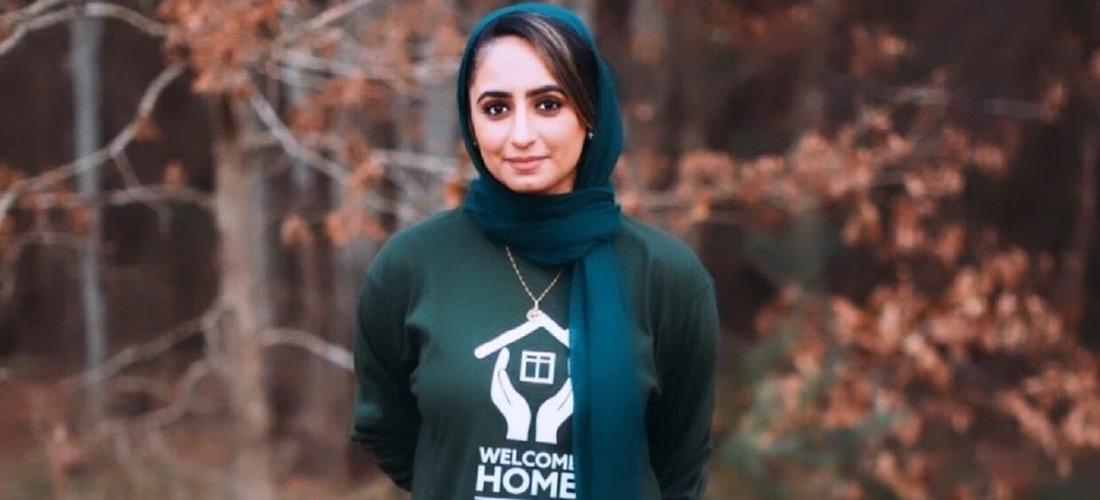
Amarra Ghani
Editorial note: All this month we are focusing on the stories of Muslim women working in charity, whether as the head of some charitable organization, doing volunteer work or anything in between. We want to explore what drives these women to give of themselves to others, how they balance that in their lives and what advice they have to encourage others to take up work to help those in need.
Our Blog Editor, Dilshad, recently shared with all of the Haute Hijab writers about her hopes for this November series, which is focusing on the work Muslim do in charitable endeavors. What is some of the good work being done around the country, in local communities and on national levels? What motivates these women to give back? How can their work inspire our youth to give of themselves in a balanced way?
She asked each of us to come up with a woman (or women-led organization) we wanted to write about, and one particular wonderful lady immediately came to mind in my Charlotte, N.C. community. My conversation with Amarra Ghani not only opened my eyes to the profound work she and her team are doing in the greater Charlotte area, but also to the fact that I had no idea so much of this was happening right in my hometown.
I caught up with Amarra and asked her about what motivated her to get involved with refugee work and how that work has grown into an organization, Welcome Home, that helps refugees get back on their feet and become more self-sufficient.
Tell me a little bit about yourself and how you got involved in the Charlotte Muslim community?
My family is originally from Pakistan, and I was born in New York. I’m not a Charlotte native, in fact I’ve moved around quite a bit. I lived in New Jersey and a few other places before moving here to Charlotte, North Carolina. I feel like I’ve moved around so much [that] I don't know where I’m from. I’ve lived in so many places, and all the while I’ve been looking for a space for myself.
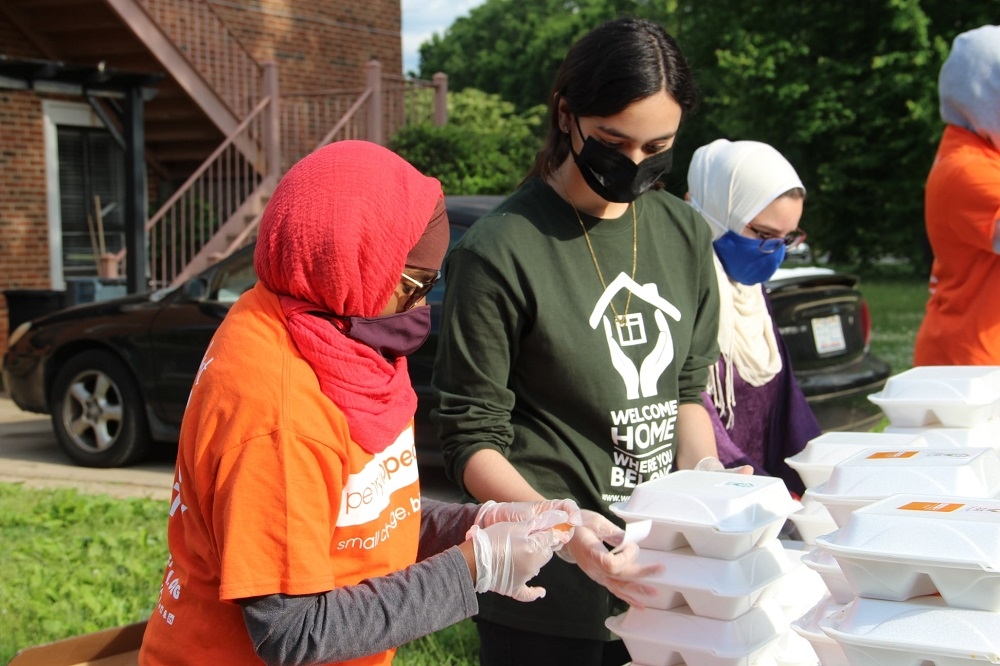
Welcome Home volunteers help with setting up for drive-thru iftars during Ramadan 2021.
Later I moved to Charlotte and have been living here for the past five years. I knew some people in the community, but not enough. I learned that if you’re not involved in the community, you’re going to miss out on meeting people. In 2016 I started hosting my own events to meet people. I would have dinners and sweater parties at my house to get to know people and make new friends.
What sparked your interest in giving back to your community?
In 2017, I hosted a friendsgiving during the time of the Syrian refugee crisis. I [was feeling helpless] hearing the news and seeing the events unfold. It felt so far and out of reach from what I could do. So, I had an idea: Instead of people just coming to eat my friendsgiving dinner, why don't we also collect winter clothing? I decided to donate the winter items to local refugee families. At that point I didn’t know who worked with them. I wanted to help local people who are in need.
I briefly knew a community member [through Facebook] who worked with refugee families. She sent me a list of basic household items that families need. I put the list on Facebook, and it basically went off from there. I started to pick up things from people’s homes. We were sending van loads to the community member’s house. They say a lot of good ideas come out of garages, and we were literally sorting the donation items in our garage and sending them out for families in need.
I started a Whatsapp group [called] “Welcome Home.” We started with around 20-30 volunteers, and now we have 230, Masha’Allah. Anytime there's a need that would arise, we put it in the chat. I’ve actually never met most of these people in the group. It’s been so inspiring to see all these local people donating and coming together to help.
Tell me more about your project, Welcome Home. What sparked your interest in growing this charity organization?
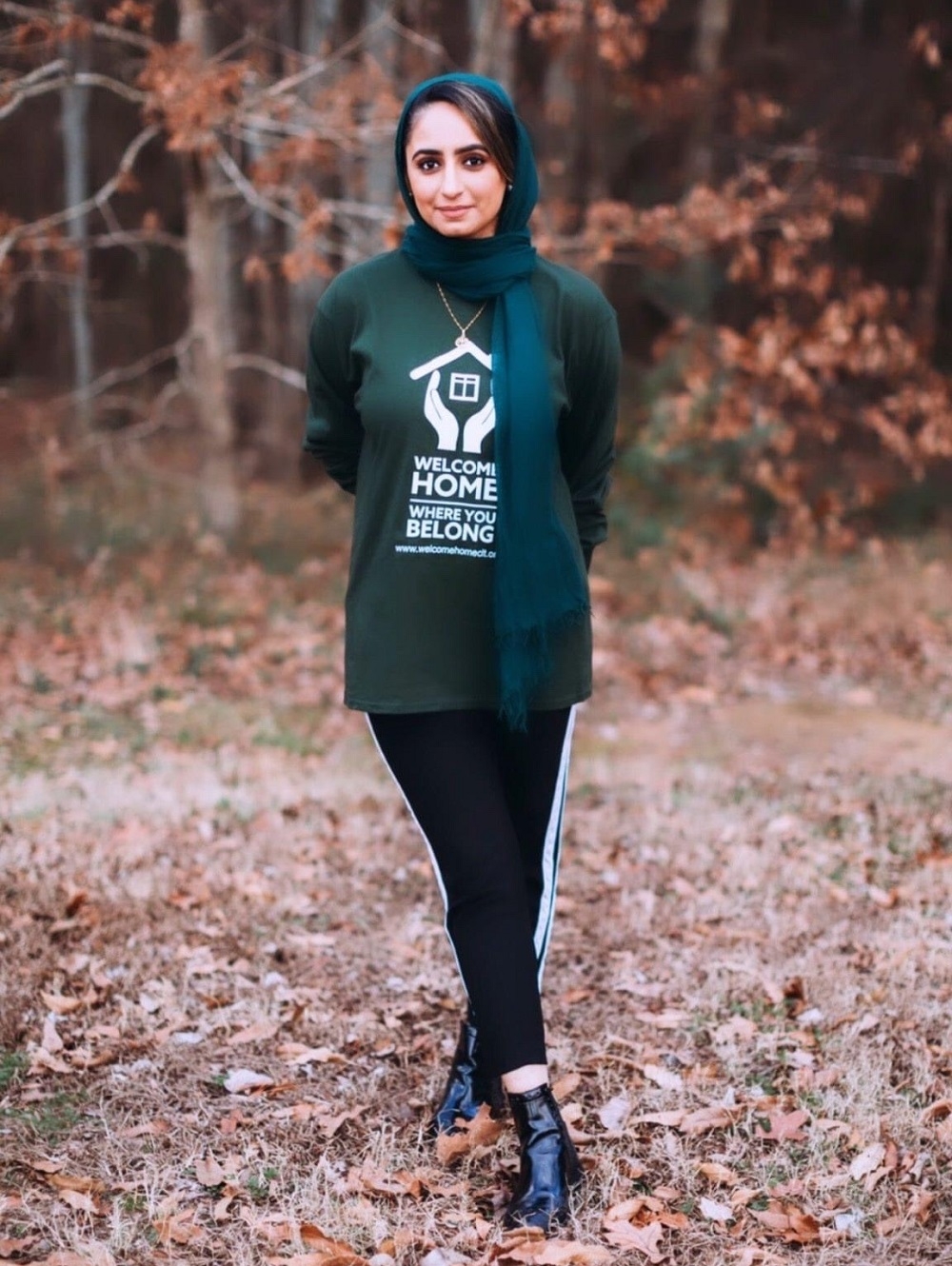
Welcome Home's Amarra Ghani
In 2018 we partnered with United Muslim Relief (UMR) to do an Eid gift drive. At this point we were a little more well known in the community and surrounding areas. This was our first partnership. People were going to Muslim houses and dropping off Eid gifts for the refugees. The Muslim family would get to the refugee family’s home, and they would find a “welcome friend” of a different faith or background. I then realized that this is what we were missing in the Muslim community. There was a big gap between refugees resettling and Muslim volunteers at the forefront helping them settle in.
It's also a responsibility for us as Muslims to be at the forefront of these spaces. It’s always nice to do volunteering and give back; you feel good. But more than feeling good, it's a big responsibility. There has to be a second part where we come in as investors. We are investing in refugee communities.
It’s not about integration. Integration is coming into our community and practicing our way of living. We are a melting pot community and we need to celebrate being a melting pot. So many of us Muslim Americans run away from who we are, whether that’s celebrating religion or culture openly. We get lost in being like others. [When it comes to refugees,] nobody leaves home unless it's too dangerous. Nobody is going to leave familiarity. When these families and individuals are crossing borders as asylum seekers or refugees, we want to make sure we are sensitive to those feelings.
Welcome Home isn't just about giving Eid gifts or donations, it’s more about helping others to be more self-sufficient. A lot of first generation [youth] have seen how much it’s taken our parents to get where they are today. If our parents had the resources we have now, they wouldn't have lost so much time and effort trying to make ends meet to provide a solid future for their children. Welcome Home is a way of connecting people to the resources that exist.
What are the phases of support that Welcome Home has in place to help refugees?
Phase one is profile.
We meet the family and evaluate them. We find out how many members are in the family and their ages. We learn about their skill sets. We pinpoint their immediate needs and call out for donations such as furniture, kitchenware and basic household items. Once they’re settled and don’t need anything immediate, we help them find jobs and transportation.
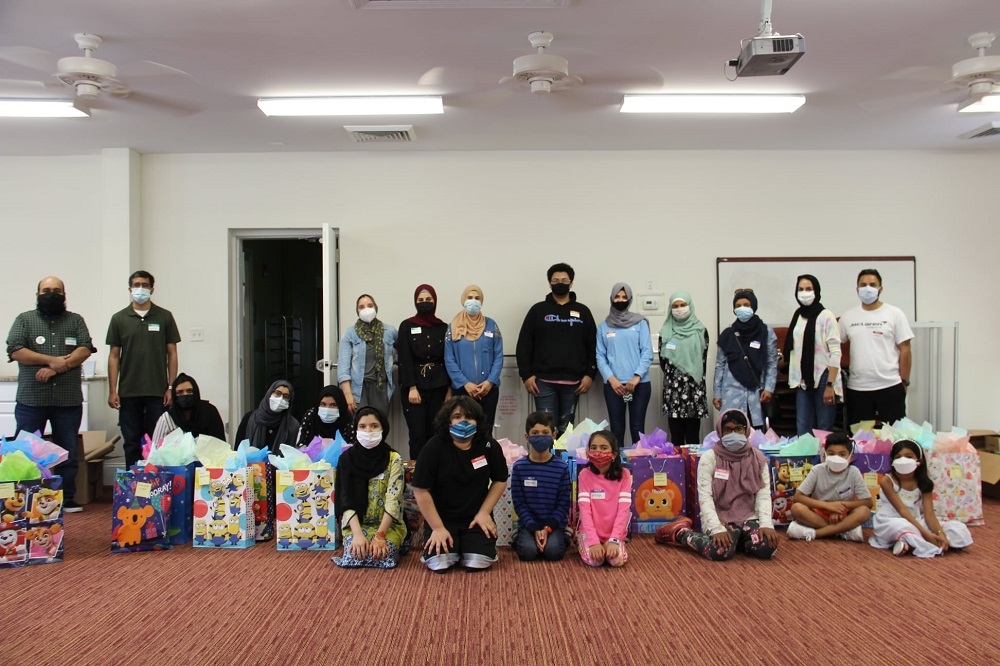
Welcome Home volunteers with the Eid gift bags they packed.
Phase two is sustainability.
English learning program: We provide 30 minutes to one-hour sessions, based on the volunteer’s time. We teach them how to express themselves and communicate in a basic conversation. “My name is___ , I live here.” We teach them how to communicate at a doctor’s office or on behalf of their kids. Pre-COVID, this was done face-to-face. But now since the pandemic, we have had to put this program on pause and are exploring virtual options to continue the English learning program.
One big issue since the pandemic started and trying to launch a virtual program is what do we do when it comes to laptops and tech resources? Right now we are focusing on curriculum and how to launch, but we are also running into supply and technical issues.
There has been a big push for in person English classes due to the human interaction factor. A big part of this program is that person-to-person interaction. It has been fun to see tutors getting close to students and building a relationship together. They are breaking bread together and having tea after class. One of our main goals is connecting people together: I have a skill that I can help you with. There’s a trade I can teach you.
Phase two is further broken down into:
Food bank program: A lot of the families we help are on government assistance that lasts for three months, then on they’re on their own. We have donors who donate basic food necessities and food bank services. If a family needs help, we help them out financially in order for them to get groceries.
Appointment program: This program has been on a pause due to COVID. Our goal with this program is to take members to their appointments. Usually the families we help have one car per household. The breadwinner takes two or three shifts, which means they are working long hours and missing out on doctor appointments. This is where we step in and provide transportation and help.
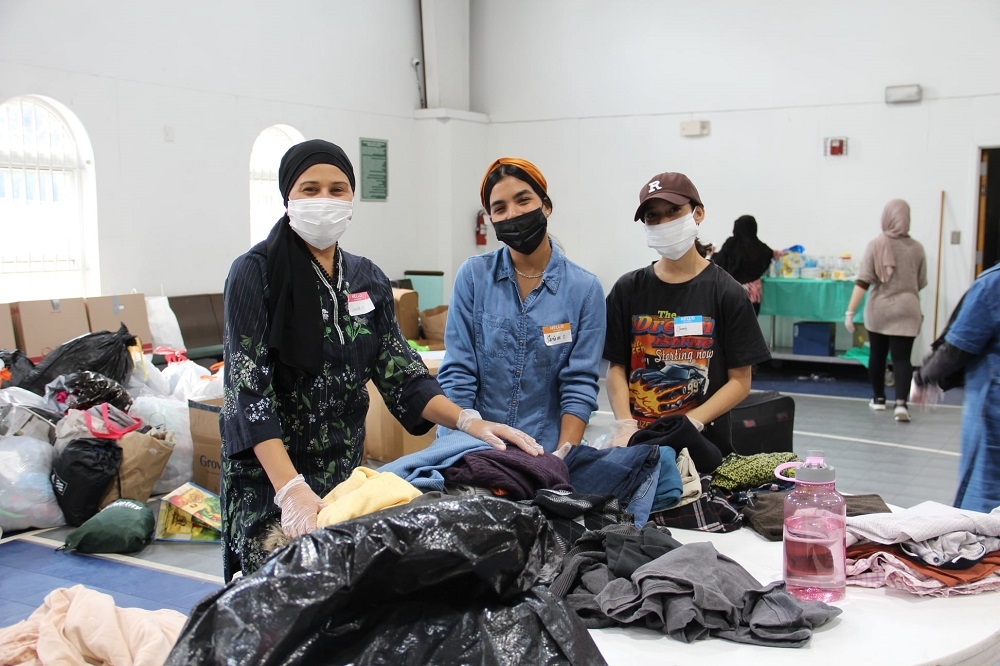
Welcome Home volunteers sort clothing.
Phase three is when our families start becoming helpers of other families.
This is definitely the most rewarding phase, when we have families who were initially refugees in need of our help now helping us aid others. We have one family in particular whom we’ve worked with and now is helping us serve others. Our work at Welcome Home is not “us” vs “them.” It is about connecting communities.
We are [now] connected with the city of Charlotte’s Carolina Refugee Resettlement Agency (CRRA). They are government funded organizations that do sponsorship and housing. We also have connections with the Refugee Support Services (RSS) organization here in Charlotte. [These larger organizations now] reach out to us more often because they see the value we bring to the community.
What advice do you have for others to encourage them to make time for volunteer/charity work?
You have to take the first step. You won't know what you’re missing out on until you throw yourself in that mix. A lot of non-profit organizations need the hands. We are looking for people who are invested. If you make the time to invest in someone else's lives, you don't know the impact you have until you do it with consistency, when you do something so often that it becomes second nature. We know this to be true in Islam:
Abu Huraira reported: The Messenger of Allah, peace and blessings be upon him, said, “Take up good deeds only as much as you are able, for the best deeds are those done regularly even if they are few.” [Sunan Ibn Mājah 424]
If you’re struggling with anything in your life, do something for someone else, and slowly you’ll see the barakah in your time. You’ll actually have more time to spare. These are the blessed ways we’ve been taught by our beloved Prophet Muhammad (saw) and our beautiful religion. Small but consistent acts of goodness. You have to just go and do it.
Welcome Home has been my safe haven especially during the pandemic. I'm not a good member of society if I'm not sharing what I know and the resources that exist. A leader should be serving alongside [the community]. I do this so that when I’m done with this, there is another person that can come in and fill in the gap.
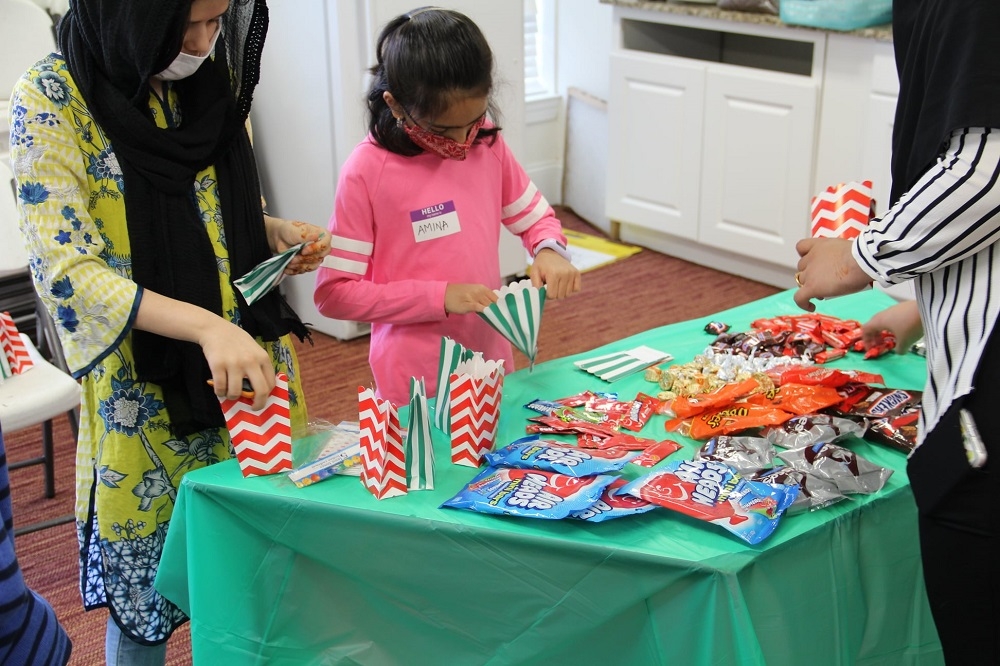
Welcome Home volunteers pack goodie bags.
I also encourage anyone, if you’re going to take on something, do it with excellence, Ihsan. This was the way of our Prophet Muhammad (saw) and a commandment from Allah (S), "And practice ihsan. Truly, Allah loves the doers of ihsan." [2:195]
Doing charity work and giving back to your community is not just doing a one and done thing.
We want Welcome Home to be a place that fosters community and belonging. More than being a foreigner in the states, refugees are coming from places that, while war torn and impoverished, have so much life and culture within their home land. We want to celebrate that and really push that narrative instead of the one that makes them seem helpless and incapable.
[Welcome Home] has a LONG way to go when it comes to true impact and longevity. We have people in our community who have been helping with refugees for decades in Charlotte. One thing we're trying to do is tie intention and projection together by creating a more organized and sustainable united front.
Click here to learn more about Welcome Home. You can also find them on social media: Instagram at @welcomehomeclt or on Facebook at Welcome Home CLT
I hope my conversation with Amarra has inspired you to take initiative in your own community and give back to those in need. Allah (S) has blessed each and every one of us with a talent, skill, or something to offer, and there is always someone on the other end waiting to receive it! Please share with us the charity work being done in your communities in the comments below!
Subscribe to be the first to know about new product releases, styling ideas and more.
What products are you interested in?

